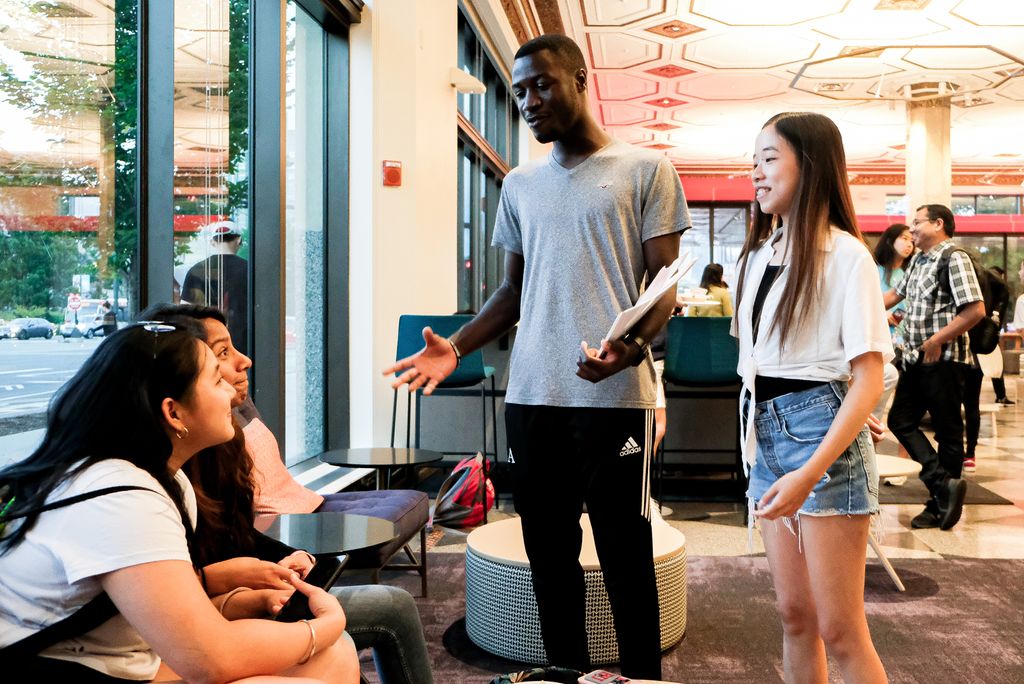Written by Rachel Farrell | April 2025
Founded in 1983, the Howard Thurman Center for Common Ground at Boston University is rooted in the teachings of Dr. Howard Thurman, a 20th century philosopher, theologian, educator, and civil rights leader who was dean of Marsh Chapel (1953-1965) and a key mentor to Martin Luther King, Jr. (GRS’55, Hon.’59).
True to Thurman’s philosophy, the center serves as “a place for community to gather,” says Director Nick Bates. “Howard Thurman believed you must engage in a process of listening to the ‘sound of the genuine’ to learn and understand more about yourself. He also believed in using meaningful, creative experiences to bring different people together. That’s what we’re challenging our community to do.”

Located at 808 Commonwealth Avenue—a 20,000-square-foot space with a striking staircase, state-of-the-art classrooms, well-stocked library, conference rooms, and more—the Howard Thurman Center is consistently bustling with activity. Each year, it produces about 150 programs, hosts nearly 300 programs, and manages 400-500 requests for using the space. Its upper-level classrooms are also home to 10-15 academic courses every semester.
Bates notes that managing both large-scale events and weekly or biweekly programming is a juggling act, but donor support makes it possible. “The funds donors provide allows us to create these programs and initiatives,” he says. “Because of them, we can serve as a space for the multitudes of identities to be cultivated, nurtured, and supported.”
BU students are benefiting in significant ways. “The Howard Thurman Center has played an integral role in my time at BU,” says Leah McFarlane (COM’25), a media science major. “It’s where I’ve found mentors, established friendships, and learned that leadership isn’t always about being the loudest in the room. But more, it’s about showing up, being intentional, and making room for others to do the same.”
Turning gifts into opportunities
One of the Howard Thurman Center’s signature events is its annual Martin Luther King, Jr. Day Celebration, which it presents in partnership with the City of Boston. Drawing people from across BU and Boston, the celebration typically includes a luncheon, live music, remarks from Boston Mayor Michelle Wu, and a special guest speaker. Last year, that speaker was Princeton University Professor Keeanga-Yamahtta Taylor; this year, it’s Cole Arthur Riley, author of “This Here Flesh” and “Black Liturgies.”
“The support of our donors affords us the opportunity to continue to empower and celebrate Martin Luther King, Jr.’s legacy,” says Bates, noting that donations help provide an honorarium for guest speakers.
Donor gifts also help cover production costs for TEDx BU, which the Howard Thurman Center has hosted for the past four years. The event invites BU students, faculty, and staff to present research or insights on issues they care about and are centered in the work of Howard Thurman.
Another donor-funded resource is the Common Ground Grant, which the Center uses to create cross-racial, cross-cultural, or cross-identity opportunities for BU student groups or organizations. For example, thanks to the fund, BU students from the Minority Association of Pre-Medical/Health Students can attend an annual health conference in St. Louis, and students from Alianza Latina can attend the Harvard Undergraduate Latina Empowerment & Development Conference.
Finally, one of the center’s longest-running programs, “Coffee & Conversation,” brings students together every Friday to talk openly about a range of issues—everything from pop culture to politics. “The setting is welcoming, thought-provoking and, quite honestly, encourages us to challenge one another’s ideas,” says McFarlane. “It has helped me grow more confident in approaching dialogue with openness and care.”
A beacon for pluralism
As the Howard Thurman Center begins its next chapter, Bates is working towards several new initiatives, all that can benefit from donor support. One is to create a lecture series that acknowledges the work of both Howard and Sue Bailey Thurman, a practitioner who implemented many of her husband’s ideals. “It’s important that we create a large stage to highlight the legacy and history of [Sue and Howard’s] work and bring in scholars and other people who are associated or informed by it,” says Bates. “They are the ones continuing their work.”

For now, Bates takes pride in what the Howard Thurman Center has already achieved. “I take the most joy in knowing that we have created space for nurturing conversations across differences,” he says. “We have always been the place where people want to gather, find community, and share a loving spirit of compassion. No one has been able to do that in the way we have.”
McFarlane agrees. “Being involved in the center,” she says, “has given me a deeper understanding and appreciation for what it means to build inclusive spaces.”
When the BU community comes together, incredible things happen. Giving Matters celebrates the ongoing impact of annual support. Give now to help shape the future.
